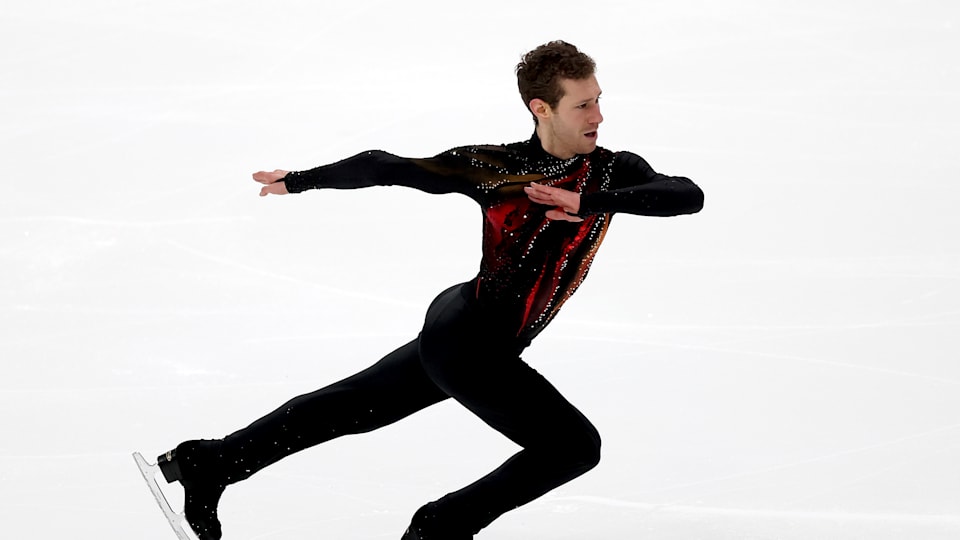"I’m carving my own path": Jason Brown on his one-of-a-kind quest – and openness to the 2026 Olympics
The two-time Olympian and veteran international figure skater speaks to Olympics.com exclusively on how his approach to the sport has morphed as he writes a new chapter.

While his peers crisscrossed figure skating’s Grand Prix Series this season, Jason Brown made his way to a small international event in Warsaw, Poland, in early December.
The reason: Brown, now 29, needed to keep his international eligibility if he wanted to qualify for this year’s World Championships.
Eleven seasons into his career, the two-time Olympian and 2015 U.S. champion is creating an approach that is uniquely his own with a schedule that is focused around exhibition shows instead of the rigours of competitive skating.
“After the 2022 Olympics, I was like, ‘I'm done with the cycle,’” he tells Olympics.com in an exclusive interview. “I've been doing it for so many years, and I could feel that my body has kind of reached its limit [with] that.”
It’s part of Brown’s focus on listening to himself and his own wants as he settles into a fourth Olympic cycle. Once “the most coachable skater... I was a chameleon,” the nine-time Grand Prix medallist says.
But now?
“I've kind of found my voice,” he says, having won his eighth U.S. medal in January (silver, behind Ilia Malinin). “In this particular time in my career, I'm carving my own path. That's been really cool... really empowering, motivating, and exciting. And, yeah, there's definitely bumps along the way, but I'm owning that and I'm learning from them and moving forward the best that I can.”
Jason Brown on the 2026 Olympics: ‘I would love to be there’
On the edge of retirement following the Olympic Winter Games Beijing 2022, Brown instead opted to continue on in a fashion rarely (if ever?) used before in the sport. The less-demanding competition schedule has been easier on his body... and has freed up his mind.
So much so to have Winter Olympic dreams – again.
“It's not my end goal in terms of that's what I'm focused on, but I would love to be there in Milan,” he says. “I would love to be competing.
Brown continues: “I’ve had so many different chapters in my career. In 2014, I became all about the Olympics. And then I missed out on 2018 and learned a lot, grew a lot... [I] did not handle the pressure well. And then the next four years was locked in for 2022 in Beijing. Moving forward to Milan, it’s not the end-all, be-all. But if that’s a stop on the way that I can compete and do it? Then 100 percent. Mentally I’m there.”
Brown was fifth at last year’s Worlds, marking his only other international competition aside from Warsaw since the 2022 Winter Games. He’ll head into Montreal later this month with another shot at a top-six finish, though he’ll need his full repertoire of triple jumps to be firing as he’s one of few top men to lack a quadruple.
“It’s definitely evolved,” Brown says of thoughts around 2026. “Last year, I was like, ‘Let’s just focus on this one extra year.’ ... But it bled into this year, where I felt like I could keep competing in this unique way.
“And then I got to do shows in Italy at the beginning of this year and when you’re in Italy and thinking about the [Olympics in Italy]. I just thought, ‘Wow, this could be really cool. I’ve started to see it... and imagine the possibility of it.”
Jason Brown on paying it forward: The kids are the heroes
Brown has maintained his standing as one of the most accomplished artistic skaters of his era, buoyed by an American (and international) fanbase that has watched him go from teenage prodigy to doing-it-my-own way veteran.
“I’ve been in the public eye,” Brown says of the skating fan base. “They’ve really seen me grow up; seen me struggle. They’ve seen me rise to the occasion and they’ve seen me fall and fall and fall. And they’ve been there to cheer for me to get back up.
“I’ve been pretty fortunate that I’ve been able to stay healthy and stay in the sport as long as I have,” he adds. “They’ve seen me make Olympic teams and miss them; seen me at my best and worst. ... I’m so grateful [and] I love to perform for them.”
Brown has also consistently paid his successes forward: Since 2014 he has visited local Ronald McDonald Houses – which provide accommodations for visiting families who have children being treated at nearby medical facilities – across the U.S. and around the globe after competitions, often bringing a bag full of gifts that had been thrown for him onto the ice.
“Hearing those families’ stories and what they've gone through and seeing those brave children that are going through so much... they are the heroes,” says Brown. “And it just puts so much in perspective: Like, I fell or had a bad day on the ice and I didn’t skate well. You get back up and you keep going back.”
“They are the ones who inspire me. So it just puts everything back into perspective.”
Brown hopes he can serve as some sort of inspiration, too.
“I really love getting into the communities we compete in and draw as many people into the sport that I love,” he explains. “I’m able to [go] because the audience throws these stuffed animals or gifts for me onto the ice... That’s how I pay it forward.”
